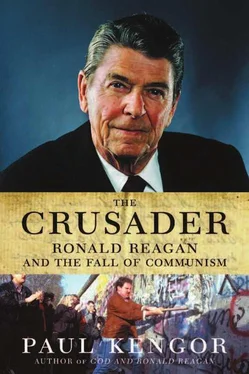And then, as I tried to write… (pause) let your minds turn to that task. You’re going to write for people a hundred years from now who know all about us. We know nothing about them. We don’t know what kind of a world they’ll be living in….
[W]e live in a world in which the great powers have poised and aimed at each other horrible missiles of destruction, that can, in a matter of minutes, arrive in each others’ country and destroy virtually the civilized world we live in.
And suddenly it dawned on me. Those who would read this letter a hundred years from now will know whether those missiles were fired. They will know whether we met our challenge. Whether they have the freedoms that we have known up until now will depend on what we do here. Will they look back with appreciation and say, “Thank God for those people in 1976 who headed off that loss of freedom, who kept our world from nuclear destruction?”… This is our challenge. 54
It was an extemporaneous speech—no text, no cards, no teleprompter—and a compelling one. Always believing in the power of a story—the right story, which is not always an easy choice when trying to appeal to the broadest segment—Reagan had found one. Official biographer Edmund Morris later wrote: “The power of the speech was extraordinary. And you could just feel throughout the auditorium the palpable sense among the delegates that [they had] nominated the wrong guy.” 55
Despite last-minute second guessing, Republicans had made their choice. The race for the GOP presidential nomination had come down to the wire, and Ronald Reagan had just ended a remarkable run at the presidency. He had tried something extremely difficult: Usually a loyal party man—his “eleventh commandment” was “thou shall not speak ill of another Republican”—he had attempted to take the nomination from the Republican incumbent, President Gerald R. Ford. He fell frustratingly short, missing by only 117 votes, grabbing 47.4 percent of delegates in an 1,187 to 1,070 contest. The winner needed 1,130.
Three months later, Gerald Ford lost the presidency to Jimmy Carter. Michael Reagan recalls that August 1976 evening vividly: “We were upstairs. We just found out that Bob Dole had been picked as the vice presidential nominee. I asked my dad if he was disappointed. He said that what disappointed him the most was that he would not get a chance to look a Soviet leader in the eye and say, ‘Nyet.’” 56
Michael’s sister Maureen never forgot a separate response from her father. Maureen described herself as “just devastated” by the defeat, and said she cried for two days—“I just couldn’t stop.” She remembers how it was traumatic for everyone but her father, who smiled at her and asked, “Are you still crying?” He pulled her aside and shared with her some of Grandma Nelle’s theology: “There’s a reason for this…. Everything happens for a reason…. [T]he path is going to open up.” 57
Ronald Reagan might have later found the reason in those words he spoke that evening in Kansas City: Rather than waiting 100 years, future generations needed only a decade or so to learn, mercifully, and with gratitude, that those missiles were not fired. To Reagan, the key to avoiding that exchange would be to end the confrontation altogether. The key would be to end the Cold War, to end the Soviet empire.
DURING THE LAST WEEK OF JANUARY 1977, ONLY DAYS AFTER Jimmy Carter had been inaugurated president, Richard V. Allen boarded a plan on the East Coast destined for the West Coast. Allen was planning to run for governor of New Jersey, and had all the credentials. He flew to California to ask Ronald Reagan to do a fundraiser for his coming campaign. Reagan happily agreed. By Allen’s description, the two men ended up “talking and talking and talking” about foreign policy—for four hours. As the conversation in Reagan’s Los Angeles home went on, they ate sandwiches. 58
With the bruising presidential campaign five months behind him, a rejuvenated Reagan shared some candid thoughts with Allen, and none more frank or significant than this: “Dick, my idea of American policy toward the Soviet Union is simple, and some would say simplistic. It is this: We win and they lose. What do you think of that?”
Allen’s eyes flew wide open. He had held a number of foreign-policy jobs, including under Nixon and Kissinger, was a member of the Council of Foreign Relations, worked at the Center for Strategic & International Studies, had written five books on foreign policy, and had never encountered such thinking. “One had never heard such words from the lips of a major political figure,” he later remarked. “Until then, we had thought only in terms of ‘managing’ the relationship with the Soviet Union. Reagan went right to the heart of the matter…. [H]e believed we could outdistance the Soviets and cause them to withdraw from the Cold War, or perhaps even collapse.”
Allen had heard enough. He was hooked: “I needed no additional information, and resolved to help him, in some way, elevate that thought to the status of national policy. Herein lay the great difference, back in early 1977, between Ronald Reagan and every other politician: He literally believed that we could win, and was prepared to carry this message to the nation as the intellectual foundation of his presidency.” 59
Reagan’s resolution was a prediction not merely on Communism’s end but on the final endgame between the two combatants, with America vanquishing the Red Menace with his hand at the helm. Allen dubbed it “at once a prophecy and a plan.” 60
Asked twenty-four years later for clarification of this remarkable incident for inclusion in this book, Allen was unequivocal. I asked him: “Are you telling me that on that day in January 1977, Ronald Reagan told you that his goal was to take on and defeat the Soviet empire? That’s what you’re telling me?” Allen replied: “Yes. That’s absolutely right. That’s what I’m telling you.” When asked to further clarify “that Reagan in fact had a specific intent to take on and defeat the USSR and the Soviet empire before his presidency even began. Was that his intent?” Allen again tersely affirmed: “Yes.” 61
On that January day, Allen was moved to join the cause. He went to Los Angeles to recruit Reagan but instead Reagan recruited him. Allen was so impressed with Reagan and so sold on the Californian’s commitment to kill the Soviet empire, that he dropped his gubernatorial campaign to join Reagan’s presidential campaign. Now, the world waited—as did the 1980 presidential contest.
THE 1970S WOULD SOON COME TO A CLOSE WITH A SCREECHING halt, ushering in the visible realities of America’s weaknesses, which had festered and grown—from a poor economy to unhealthy doses of détente. Americans found themselves in desperate need of hope, a hope they had not felt in years. It was the hope for a strong America and a better world. It was a hope that American presidents had been unable to deliver in years. It was a hope that one man was convinced he could deliver now.
6. “Let’s Make America Great Again”: 1980
BY APRIL 24, 1980, FIFTY-THREE AMERICAN HOSTAGES HAD BEEN held for six months at the U.S. embassy in Tehran. President Jimmy Carter had negotiated with Iran but to no avail. Exasperated, he authorized a risky operation to rescue the hostages. “I do not want to undertake this operation,” he told his military brass, “but we have no other recourse….We’re going to do this operation.” 1Carter judged it was time “to bring our hostages home; their safety and our national honor were at stake.” 2
The adrenaline surged among elite U.S. forces. Carter’s plan called for a complex two-night operation involving hundreds of varied personnel, including the elite Delta Force and its 132 commandos and a unit of Army Rangers. Forty-four aircraft would be deployed among six different locations, among them the critical RH-53 helicopters and C-130 Hercules transports rigged with temporary 18,000-gallon fuel tanks. On day one, the helicopters and C-130s would meet in an isolated spot in the Iranian desert where they would refuel the choppers, load the rescue team, and move on to hideouts near Tehran. On day two, undercover U.S. intelligence agents with trucks would escort the elite forces to the embassy, where they would seize the building and evacuate the hostages to a nearby soccer stadium. From there, all would be picked up by the helicopters and taken to the Iranian-controlled Manzariyeh Air Base forty miles away. Army Rangers were to take and hold the air base, shooting anyone who threatened the mission. Once the copters arrived, so would C-141s to fly out the hostages and rescue team.
Читать дальше












